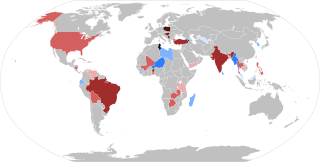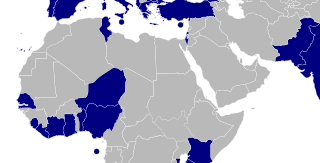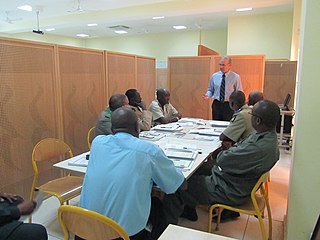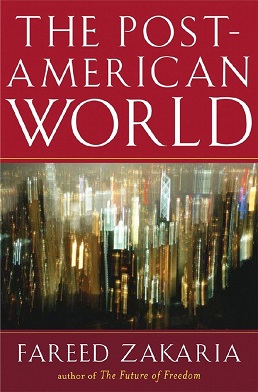
The End of History and the Last Man is a 1992 book of political philosophy by American political scientist Francis Fukuyama which argues that with the ascendancy of Western liberal democracy—which occurred after the Cold War (1945–1991) and the dissolution of the Soviet Union (1991)—humanity has reached "not just ... the passing of a particular period of post-war history, but the end of history as such: That is, the end-point of mankind's ideological evolution and the universalization of Western liberal democracy as the final form of human government." For the book, which is an expansion of his essay "The End of History?", Fukuyama draws upon the philosophies and ideologies of Georg Wilhelm Friedrich Hegel and Karl Marx, who define human history as a linear progression, from one socioeconomic epoch to another.
Totalitarian democracy is a term popularized by Israeli historian Jacob Leib Talmon to refer to a system of government in which lawfully elected representatives maintain the integrity of a nation state whose citizens, while granted the right to vote, have little or no participation in the decision-making process of the government. The phrase had previously been used by Bertrand de Jouvenel and E. H. Carr, and subsequently by F. William Engdahl and Sheldon S. Wolin.
Asian values was a political ideology of the 1990s, which defined elements of society, culture and history common to the nations of Southeast and East Asia. It aimed to use commonalities – for example, the principle of collectivism – to unify people for their economic and social good and to create a pan-Asian identity. This contrasted with perceived European ideals of the universal rights of man. The concept was advocated by Mahathir Mohamad and by Lee Kuan Yew, as well as other Asian leaders. It has been often used by nondemocratic leaders to justify repression of political opponents, which has been described as violating their human rights, through the justification that "human rights are not part of Asian values".

Democratization, or democratisation, is the transition to a more democratic political regime, including substantive political changes moving in a democratic direction. It may be the transition from an authoritarian regime to a full democracy, a transition from an authoritarian political system to a semi-democracy or transition from a semi-authoritarian political system to a democratic political system.

The democratic peace theory posits that democracies are hesitant to engage in armed conflict with other identified democracies. Among proponents of the democratic peace theory, several factors are held as motivating peace between democratic states. Variations of the democratic peace theory emphasize that liberal and republican forms of democracies are less likely to go to war with one another. Variations of the democratic peace hold its "monadic" ; "dyadic" ; and "systemic".
An illiberal democracy describes a governing system in which, although elections take place, citizens are cut off from knowledge about the activities of those who exercise real power because of the lack of civil liberties; thus it is not an open society.

Fareed Rafiq Zakaria is an Indian-American journalist, political commentator, and author. He is the host of CNN's Fareed Zakaria GPS and writes a weekly paid column for The Washington Post. He has been a columnist for Newsweek, editor of Newsweek International, and an editor at large of Time.

According to The Economist Group's Democracy Index 2020 study, Israel is the only democratic country in the Middle East, while Tunisia is the only democracy in North Africa. The level of democracy in nations throughout the world published by Freedom House, a U.S.-based, U.S. government-funded advocacy organization, and in various other freedom indices, report the Middle Eastern and North African countries with the highest scores are Israel, Tunisia, Turkey, Lebanon, Morocco, Jordan and Kuwait. Countries that have been consistently labelled as 'not free' by Freedom house (2017-2021) have been Iran, Iraq and Egypt. They have been increasingly becoming more and more adverse to the idea of liberal democracy with their scores steadily decreasing, only Iraq out of these countries have maintained some level of internet freedom with a score of 41/100. The remaining countries of the Middle East are categorised as authoritarian regimes, with the lowest scores held by Saudi Arabia and Yemen.
Constitutional liberalism is a form of government that upholds the principles of classical liberalism and the rule of law. It differs from liberal democracy in that it is not about the method of selecting government.
A liberal autocracy is a non-democratic government that follows the principles of liberalism. Until the 20th century, most countries in Western Europe were "liberal autocracies, or at best, semi-democracies". One example of a "classic liberal autocracy" was the Austro-Hungarian Empire. According to Fareed Zakaria, a more recent example is Hong Kong until 1 July 1997, which was ruled by the British Crown. He says that until 1991 "it had never held a meaningful election, but its government epitomized constitutional liberalism, protecting its citizens' basic rights and administering a fair court system and bureaucracy".

Liberal democracy is the combination of a liberal political ideology that operates under an indirect democratic form of government. It is characterised by elections between multiple distinct political parties, a separation of powers into different branches of government, the rule of law in everyday life as part of an open society, a market economy with private property, and the equal protection of human rights, civil rights, civil liberties and political freedoms for all people. To define the system in practice, liberal democracies often draw upon a constitution, either codified or uncodified, to delineate the powers of government and enshrine the social contract. After a period of expansion in the second half of the 20th century, liberal democracy became a prevalent political system in the world.

Democracy promotion, which can also be referred to as democracy assistance, democracy support, or democracy building, is a strand of foreign policy adopted by governments and international organizations that seek to support the spread of democracy as a political regime around the world. Among the reasons for supporting democracy include the belief that countries with a democratic system of governance are less likely to go to war, are likely to be economically better off and socially more harmonious. In democracy building, the process includes the building and strengthening of democracy, in particular the consolidation of democratic institutions, including courts of law, police forces, and constitutions. Some critics have argued that the United States has used democracy promotion to justify military intervention abroad.
Defective democracies is a concept that was proposed by the political scientists Wolfgang Merkel, Hans-Jürgen Puhle and Aurel S. Croissant at the beginning of the 21st century to subtilize the distinctions between totalitarian, authoritarian, and democratic political systems. It is based on the concept of embedded democracy. There are four forms of defective democracy, how each nation reaches the point of defectiveness varies. One recurring theme is the geographical location of the nation, which includes the effects of the influence of surrounding nations in the region. Other causes for defective democracies include their path of modernization, level of modernization, economic trends, social capital, civil society, political institutions, and education.

The Post-American World is a non-fiction book by American journalist Fareed Zakaria. It was published in hardcover and audiobook formats in early May 2008 and became available in paperback in early May 2009; the Updated and Expanded Release 2.0 followed in 2011. In the book, Zakaria argues that, thanks to the actions of the United States in spreading liberal democracy across the world, other countries are now competing with the US in terms of economic, industrial, and cultural power. While the US continues to dominate in terms of political-military power, other countries such as China and India are becoming global players in many fields.
Authoritarianism is a form of government characterized by the rejection of political plurality, the use of strong central power to preserve the political status quo, and reductions in the rule of law, separation of powers, and democratic voting. Political scientists have created many typologies describing variations of authoritarian forms of government. Authoritarian regimes may be either autocratic or oligarchic and may be based upon the rule of a party or the military.

American democracy promotion aims to encourage governmental and non-governmental actors to pursue political reforms that will lead ultimately to democratic governance.
A hybrid regime, of which the most common type is competitive authoritarianism, is a mixed type of political regime that is often created as a result of an incomplete transition from an authoritarian regime to a democratic one. Hybrid regimes combine autocratic features with democratic ones and can simultaneously hold political repressions and regular elections. The term hybrid regime arises from a polymorphic view of political regimes that opposes the dichotomy of autocracy or democracy. Hybrid regimes are characteristic of resource countries such as petro-states. Those regimes are stable and tenacious.
The March to Modernity, coined by Kishore Mahbubani in his 2008 book, "The New Asian Hemisphere: The Irresistible Shift of Global Power to the East", refers to Asia's modernization using and adapting the seven pillars of Western ideology, causing Asia to rise and to become the new global power. Asia’s modernity was first achieved by Japan and India. Japan's success was emulated by the four economic tigers: South Korea, Taiwan, Hong Kong, and Singapore. China followed soon after by launching its "Four Modernizations" program. China's success of the past three decades in turn inspired the rise of India. Asians are marching to modernity.

Embedded democracy is a form of government in which democratic governance is secured by democratic partial regimes. The term "embedded democracy" was coined by political scientists Wolfgang Merkel, Hans-Jürgen Puhle, and Aurel Croissant, who identified "five interdependent partial regimes" necessary for an embedded democracy: electoral regime, political participation, civil rights, horizontal accountability, and the power of the elected representatives to govern. The five internal regimes work together to check the power of the government, while external regimes also help to secure and stabilize embedded democracies. Together, all the regimes ensure that an embedded democracy is guided by the three fundamental principles of freedom, equality, and control.
Authoritarian capitalism, or illiberal capitalism, is an economic system in which a capitalist market economy exists alongside an authoritarian government. Related to and overlapping with state capitalism, a system in which the state undertakes commercial activity, authoritarian capitalism combines private property and the functioning of market forces with repression of dissent, restrictions on freedom of speech and either a lack of elections or an electoral system with a single dominant political party.










